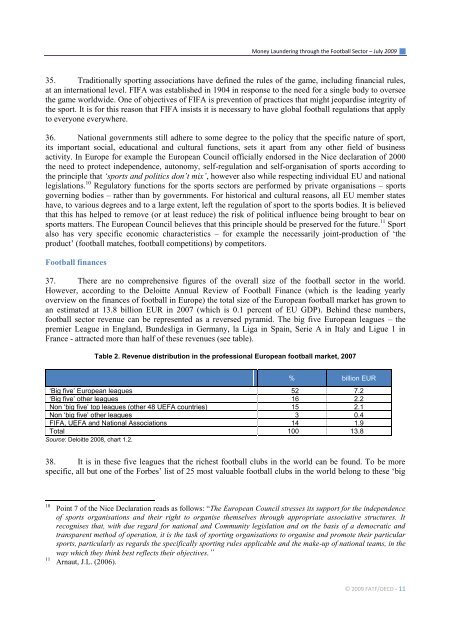Money Laundering through the Football Sector
Money Laundering through the Football Sector
Money Laundering through the Football Sector
Create successful ePaper yourself
Turn your PDF publications into a flip-book with our unique Google optimized e-Paper software.
<strong>Money</strong> <strong>Laundering</strong> <strong>through</strong> <strong>the</strong> <strong>Football</strong> <strong>Sector</strong> – July 2009 <br />
35. Traditionally sporting associations have defined <strong>the</strong> rules of <strong>the</strong> game, including financial rules,<br />
at an international level. FIFA was established in 1904 in response to <strong>the</strong> need for a single body to oversee<br />
<strong>the</strong> game worldwide. One of objectives of FIFA is prevention of practices that might jeopardise integrity of<br />
<strong>the</strong> sport. It is for this reason that FIFA insists it is necessary to have global football regulations that apply<br />
to everyone everywhere.<br />
36. National governments still adhere to some degree to <strong>the</strong> policy that <strong>the</strong> specific nature of sport,<br />
its important social, educational and cultural functions, sets it apart from any o<strong>the</strong>r field of business<br />
activity. In Europe for example <strong>the</strong> European Council officially endorsed in <strong>the</strong> Nice declaration of 2000<br />
<strong>the</strong> need to protect independence, autonomy, self-regulation and self-organisation of sports according to<br />
<strong>the</strong> principle that ‘sports and politics don’t mix’, however also while respecting individual EU and national<br />
legislations. 10 Regulatory functions for <strong>the</strong> sports sectors are performed by private organisations – sports<br />
governing bodies – ra<strong>the</strong>r than by governments. For historical and cultural reasons, all EU member states<br />
have, to various degrees and to a large extent, left <strong>the</strong> regulation of sport to <strong>the</strong> sports bodies. It is believed<br />
that this has helped to remove (or at least reduce) <strong>the</strong> risk of political influence being brought to bear on<br />
sports matters. The European Council believes that this principle should be preserved for <strong>the</strong> future. 11 Sport<br />
also has very specific economic characteristics – for example <strong>the</strong> necessarily joint-production of „<strong>the</strong><br />
product‟ (football matches, football competitions) by competitors.<br />
<strong>Football</strong> finances<br />
37. There are no comprehensive figures of <strong>the</strong> overall size of <strong>the</strong> football sector in <strong>the</strong> world.<br />
However, according to <strong>the</strong> Deloitte Annual Review of <strong>Football</strong> Finance (which is <strong>the</strong> leading yearly<br />
overview on <strong>the</strong> finances of football in Europe) <strong>the</strong> total size of <strong>the</strong> European football market has grown to<br />
an estimated at 13.8 billion EUR in 2007 (which is 0.1 percent of EU GDP). Behind <strong>the</strong>se numbers,<br />
football sector revenue can be represented as a reversed pyramid. The big five European leagues – <strong>the</strong><br />
premier League in England, Bundesliga in Germany, la Liga in Spain, Serie A in Italy and Ligue 1 in<br />
France - attracted more than half of <strong>the</strong>se revenues (see table).<br />
Table 2. Revenue distribution in <strong>the</strong> professional European football market, 2007<br />
% billion EUR<br />
„Big five‟ European leagues 52 7.2<br />
„Big five‟ o<strong>the</strong>r leagues 16 2.2<br />
Non „big five‟ top leagues (o<strong>the</strong>r 48 UEFA countries) 15 2.1<br />
Non „big five‟ o<strong>the</strong>r leagues 3 0.4<br />
FIFA, UEFA and National Associations 14 1.9<br />
Total 100 13.8<br />
Source: Deloitte 2008, chart 1.2.<br />
38. It is in <strong>the</strong>se five leagues that <strong>the</strong> richest football clubs in <strong>the</strong> world can be found. To be more<br />
specific, all but one of <strong>the</strong> Forbes‟ list of 25 most valuable football clubs in <strong>the</strong> world belong to <strong>the</strong>se „big<br />
10 Point 7 of <strong>the</strong> Nice Declaration reads as follows: “The European Council stresses its support for <strong>the</strong> independence<br />
of sports organisations and <strong>the</strong>ir right to organise <strong>the</strong>mselves <strong>through</strong> appropriate associative structures. It<br />
recognises that, with due regard for national and Community legislation and on <strong>the</strong> basis of a democratic and<br />
transparent method of operation, it is <strong>the</strong> task of sporting organisations to organise and promote <strong>the</strong>ir particular<br />
sports, particularly as regards <strong>the</strong> specifically sporting rules applicable and <strong>the</strong> make-up of national teams, in <strong>the</strong><br />
way which <strong>the</strong>y think best reflects <strong>the</strong>ir objectives.”<br />
11 Arnaut, J.L. (2006).<br />
© 2009 FATF/OECD - 11


